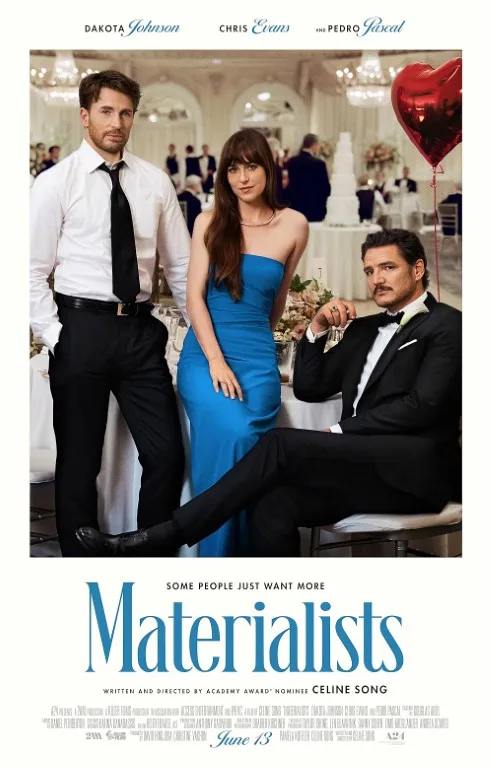To marry for love, or for money? That’s the age-old question writer-director Celine Song poses in her soulful romantic dramedy “Materialists.”
It might sound like an archaic and frankly sexist notion at a time when the culture tells women we can have it all, and we can have it right now. (We can’t actually: We can have some of it some of the time, but not all of it all of the time. But that’s another essay for another day.)
Song’s follow-up to her achingly gorgeous 2023 drama “Past Lives” draws from the traditions of Jane Austen, classic screwball comedies and the kind of early-aughts rom-coms that play in heavy rotation while you’re getting a blowout at Drybar. You could imagine Kate Hudson as a girl on the go in the big city in some fluffier version of this movie.
And yet, “Materialists” is very much its own thing: sharper and spikier, brutally honest and bracingly contemporary in its depiction of dating in 21st-century Manhattan. If you’re seeing it with hopes of glittery escapism, based on its A-list stars and a trailer that prominently features a cover of Madonna’s “Material Girl,” be prepared that the result is a little sadder, a little more substantial. And that’s much of what’s so wonderful about it.
Song achieves an impressive tonal balance here within the economic disparity of the love triangle she’s established. Yes, these are beautiful people wearing beautiful clothes in beautiful places, but the truth behind the decisions they make can be quite ugly.
Dakota Johnson’s Lucy is fully aware of that contradiction, but she still sells the dream of true love as a matchmaker to New York’s elite. Part of the initial fun of “Materialists” is that it takes the familiar shape of a traditional romantic comedy, complete with the obligatory bad-first-date montage–only these are the interviews Lucy has with potential clients, all of whom have ridiculous requirements for a potential mate.
But Lucy’s extremely good at what she does, which is clear as she attends the ninth wedding that’s resulted from one of her matches. (“The Gilded Age” star Louisa Jacobson has a brief but potent scene as the bride.) Johnson is perfect for the role because she exudes aspirational glamour, but she makes everything look effortless, like watching a fashion influencer walk around all day in real life: “Oh this? I just found it in the back of my closet and threw it on at the last minute.” (Costume designer Katina Danabassis is behind her chic ensembles.) Being blasé is her superpower in a world where everyone is trying way too hard to impress.
She can only be cool for so long, though, when she meets the dashing Harry at these elegant nuptials. He’s the groom’s brother, he’s insanely wealthy, and he’s played by a charming Pedro Pascal. Lucy thinks he’d be an incredible catch for the women who seek out her matchmaking services – a “unicorn” for his rare combination of good looks, manly height and sizable income. It’s just math, she explains matter-of-factly. But he insists he’d rather date her himself, even after she candidly informs him over a slow dance that she’s only interested in marrying for money.
The evening gets even more complicated when Lucy’s ex-boyfriend, John, turns up at the reception. He’s a cater waiter, he’s constantly broke, and he’s played by a magnetic Chris Evans. The spark between them is instantly recognizable, even after years apart, and it burns brighter than the lightly flirty banter she’d been sharing with Harry all night.
So this is the conundrum in which Lucy finds herself as she spends more time with these two extremely different men: To marry for love, or for money? To Song’s credit, neither of them is an obviously horrible choice. Both are great-looking and adoring. Both support her and treat her with respect. And for a long time, you could imagine her ending up with either one of them.
That’s the strength of Song’s writing. One of the two Academy Award nominations “Past Lives” received was for her original screenplay. Here, she once again reveals a startling ability to write characters who feel real and complicated, messy and vulnerable, but are also blessed with the gift of saying the right thing at the right time in a way that’s direct but poetic. Song’s dialogue calls to mind the qualities that have made Billy Wilder, Nora Ephron and Cameron Crowe’s work so distinctive: Her characters get to the heart of the matter and can break your heart simultaneously.
Evans does the best work of his career with this material, which allows him the opportunity to stray far from the bland perfection of Captain America. He and Johnson have a comfortable, playful chemistry, but there’s also a melancholy to his struggling-actor character that informs the whole film and gives it depth beyond its genre trappings.
A road trip late in the story allows Lucy and John to explore their feelings of regret, to consider what might have been. Cinematographer Shabier Kirchner captures a lingering wistfulness in the shifting sunlight, in the simplicity of white bulbs strung across a yard at night. And the score from Daniel Pemberton adds glamour and sprightly energy on the front end and suspense and dramatic heft as the film progresses.
A subplot involving one of Lucy’s key clients (Zoë Winters from “Succession”) takes “Materialists” in a direction that initially feels like a detour–literally and figuratively–and the pacing dips here a bit. But Winters’ performance is so raw that it ends up working, and it brings out a tenderness in Johnson that’s meaningful.
“Materialists” wraps up with a beautiful bookend–as Seth Rogen’s character says on “The Studio,” who doesn’t love a bookend?–that’s so clever in its framing, details and color palette that it may make you want to go back to the beginning and watch it all over again. It remains clear-eyed, even as it makes the happily-ever-after seem possible after all.




















